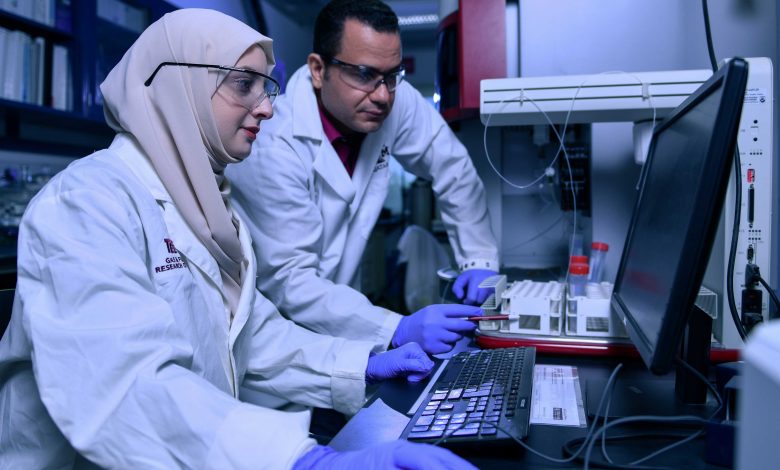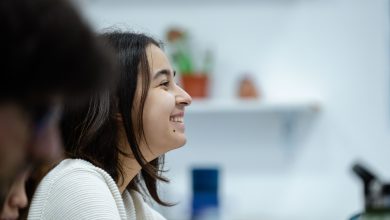
QU invents air purification filter that kills Coronavirus
جامعة قطر تبتكر فلترًا لتنقية الهواء وقتل كورونا
QNA
Doha: Innovation & Intellectual Property Office (IIP Office) at Qatar University (QU) has facilitated the registration of 39 patents for a number of university employees, and is studying seven of them to convert them into startup companies that serve the national economy.
The office, established in 2017, is responsible for managing innovation files and technology transfer, encouraging innovators, supporting and facilitating the registration of intellectual property rights in cooperation with the concerned authorities such as the Ministry of Commerce and Industry, Qatar Foundation and others, promoting awareness of these rights within the university and the Qatari society in general and building a database of all records related to intellectual property in the university.
In an interview with Qatar News Agency (QNA), Director of IIP Office Dr. Hareb Al Jabri said that the number of patent files currently managed by the office has reached 163 files, and that the office succeeded in facilitating the registration and granting of 39 patents for Qatar University employees, seven of which are being studied to transfer them into startups companies in the near future.
These innovations include multiple fields such as academy, industry, mechanical engineering, technology, health care, environment, agriculture, sports, refrigeration, the animal and fish sector and other areas that respond to national priorities and achieve maximum local benefit as well as their global impact, Al Jabri noted.
These successes reflect the QU’s keenness to translate and empower the ideas of its affiliates and provide the appropriate climate to develop them into initiatives, products and pioneering projects that serve national priorities and achieve the maximum possible local and global benefit.
The interest in innovation and technology transfer is a true translation of Qatar University’s Strategic Plan 2018-2022, which included six key goals, including seven key strategies, that includes a Digital Transformation Strategy, and an Entrepreneurship and Innovation Strategy in line with the State’s keenness to achieve its national vision to transform Qatar into a knowledge economy, he said.
The University’s strategy includes enabling initiatives in the fields of innovation and entrepreneurship, while making sure to integrate them in pure scientific disciplines as academic courses or in graduation projects in which they are considered innovative and pioneering, he pointed out.
This approach, Dr. Hareb Al Jabri said, has received great attention from the Board of Trustees of Qatar University headed by HH the Deputy Amir Sheikh Abdullah bin Hamad Al-Thani. This was translated through the formation of a higher committee at the university level to manage issues of innovation, entrepreneurship and digital transformation led by the QU’s President and vice-presidents, in an indication of the extent of interest in this field, Dr. Al Jabri added.
IIP Office was established in 2017 to undertake basic tasks in managing intellectual property, starting from the presentation of the idea by QU affiliates, the study of the technical and economic feasibility of the idea, the consideration of the possibility of obtaining a patent by the relevant committees and ending with the registration process until the patent is obtained at the local and international levels, he pointed out.
He underlined that the office strives to transform ideas and innovations into startups companies that support the economy and diversity in the Qatari economy, adding that this reflects the university’s success in transforming the traditional university environment into an innovative environment that encourages creativity and innovation and stimulates entrepreneurship in the field of business.
The office also takes into consideration the issue of converting any invention into a tangible product, IIP Office Director said, noting that some just get a patent certificate without taking a step forward to convert this invention into a commercial product serving humanity. This is one of the tasks that the office undertakes, as it helps inventors to develop, design and market their innovations, whether by licensing the innovation or establishing a startup, he added.
There was a problem facing inventors after obtaining a patent, which is how to convert the invention into a product, but after the establishment of the IIP Office, the appropriate mechanisms to develop inventions for Qatar University employees were put in place in partnership with many bodies inside or outside the country, he added.
In this context, Al Jabri said that the office provides three services to inventors, including technical support related to design and modeling, computer programs and other technical matters, the search for financing opportunities for the project and product development, and business services such as study feasibility and business model plan.
Dr. Hareb Al Jabri told QNA that the office is currently studying seven inventions to convert them into startup companies that serve the local economy. He also expected that the year 2021 will witness the opening of startup companies based on the research and innovations accomplished by QU in a manner that serves the knowledge economy.
He stressed that the QU’s success in this approach is due to the material and human capabilities that are employed in the service of the university’s strategies. He explained that the university today has more than 1,600 professors, specialists, experts and researchers in various disciplines with specialized research centers and business incubators inside and outside the University, all of this are being used to help innovators, through the IIP Office that communicates with all these bodies on behalf of innovators, saving their time and effort.
The inventor will ultimately be part of the company, and inventors’ efforts will be enhanced through specialized training courses to develop entrepreneurship skills, through the Center for Entrepreneurship (CFE), Al Jabri said.
Regarding the relationship between the office and other bodies working in this field, Dr. Al Jabri emphasized that the office has very strong relations with a large number of specialized entities in the fields of research, development and technology transfer, as well as funding, such as Qatar Foundation, Science and Technology Park, Qatar Development Bank, and the Ministry of Commerce and Industry. He pointed out that in this stage, the office seeks to develop its relations in an effort to launch startup companies in partnership with those who benefit from the nature of the product in the civil, military, oil and gas sectors, as well as the private sector companies, because each patent has a different nature, and through it the identity of the partners is defined.
Regarding COVID-19, Dr. Al Jabri said that QU has offered special support to confront the pandemic with a focus on technologies, and said that there are projects that have reached advanced stages of development.
He also said that one of the innovations has reached the experimental stage, and its technical validity has been confirmed, and it is now in the process of the intellectual property protection and is being turned into a marketable product, indicating that the innovation is a filter developed by a researcher at QU that can be placed in medical facilities to confront the virus and its function is to purify the air and kill the virus, in addition to the Robot which is still in the development stage, and its function is to ensure that the doctor communicates with patients and delivers food and medicine to them, as well as sterilization function by multiple means, whether using ultraviolet rays or remote chemical sprays, as it is equipped with several systems that enable it to do so.
He added that these are only examples of the QU’s research projects in the field of confronting the disease, and the office handles the file of patent management, product development and marketing.
The scientific research sector at QU has provided important services and accomplished many innovations to meet some challenges, for example the cooling system for the World Cup Qatar 2022 , which will be one of the emerging companies in the future, Al Jabri said..
He emphasized that the innovation process is long and arduous that requires patience to reach the ultimate goal, calling on the Qatari students and researchers to persevere and work for the progress of the nation through inventions that are important indicators of the State’s progress.
He also added that after the World Cup 2022, the country will focus more on practical research, innovation and technology, noting that this is a great opportunity for young Qatari to move towards research and development to enhance the State’s progress.
قنا
الدوحة: نجح مكتب الابتكار والملكية الفكرية بجامعة قطر في تسهيل تسجيل 39 براءة اختراع لعدد من منتسبي الجامعة، ويعكف على دراسة 7 منها لتحويلها إلى شركات ناشئة تخدم الاقتصاد الوطني.
ويتولى المكتب الذي تأسس في العام 2017، مهمة إدارة ملفات الابتكار ونقل التكنولوجيا، وتشجيع المبتكرين والمخترعين، ودعم وتسهيل تسجيل حقوق الملكية الفكرية بالتعاون مع الجهات المعنية مثل وزارة التجارة والصناعة ومؤسسة قطر وغيرها، فضلا عن تعزيز الوعي بهذه الحقوق داخل الجامعة وفي المجتمع القطري بشكل عام، وبناء قاعدة بيانات لجميع السجلات المتعلقة بالملكية الفكرية في الجامعة.
وقال الدكتور حارب الجابري مدير مكتب الابتكار والملكية الفكرية في حوار مع وكالة الأنباء القطرية /قنا/ إن عدد ملفات براءة الاختراع التي يديرها المكتب حاليا وصل إلى 163 ملفا، كما نجح في تسهيل تسجيل ومنح 39 براءة اختراع لمنتسبي جامعة قطر، 7 منها تتم دراسة تحويلها إلى شركات ناشئة في المستقبل القريب.
وأوضح أن هذه الابتكارات والاختراعات تشمل مجالات متعددة، منها المجالات الأكاديمية والصناعية والهندسية الميكانيكية والتكنولوجيا والرعاية الصحية والبيئة والزراعة والرياضة والتبريد والقطاع الحيواني والسمكي وغيرها من المجالات التي تستجيب للأولويات الوطنية، وتحقق أقصى قدر من المنفعة المحلية فضلا عن أثرها على المستوى العالمي.
وقال إن هذه النجاحات تعكس حرص الجامعة على ترجمة أفكار منتسبيها وتمكينها، وتوفير المناخ الملائم لتطويرها إلى مبادرات ومنتجات ومشاريع ريادية تخدم الأولويات الوطنية وتحقق أقصى قدر ممكن من المنفعة المحلية والعالمية.
كما أشار إلى أن الاهتمام بالابتكارات ونقل التكنولوجيا هو ترجمة حقيقية للخطة الاستراتيجية لجامعة قطر للأعوام 2018 2022، التي تضمنت ست غايات أساسية، تندرج تحتها سبع استراتيجيات رئيسية، من بينها استراتيجية التحول الرقمي، واستراتيجية الريادة والابتكار، بما يتناغم مع حرص الدولة في رؤيتها الوطنية على التحول إلى اقتصاد المعرفة.
وذكر مدير مكتب الابتكار والملكية الفكرية أن استراتيجية الجامعة تتضمن مبادرات تمكينية في مجالات الابتكار وريادة الأعمال، مع الحرص على دمجها في التخصصات العلمية البحتة كمقررات دراسية أو في مشاريع التخرج التي يراعى فيها أن تكون ابتكارية وريادية.
وأضاف أن هذا التوجه حظي باهتمام بالغ من قبل مجلس أمناء جامعة قطر برئاسة سمو الشيخ عبدالله بن حمد آل ثاني نائب الأمير، وتمت ترجمة ذلك من خلال تشكيل لجنة عليا على مستوى الجامعة لإدارة قضايا الابتكار وريادة الأعمال والتحول الرقمي بقيادة رئيس الجامعة ونواب الرئيس في مؤشر على مدى الاهتمام بهذا المجال.
وأفاد بأنه تم في السياق ذاته تأسيس مكتب الابتكار وحماية الملكية الفكرية في العام 2017، الذي يتولى مهمات أساسية تتمثل في إدارة الملكية الفكرية بدءا من تقديم الفكرة من قبل منتسبي الجامعة، مرورا بدراسة الجدوى الفنية والاقتصادية للفكرة، ثم النظر في قابلية الحصول على براءة اختراع من قبل اللجان المختصة وانتهاء بعملية التسجيل إلى أن يتم الحصول على براءة الاختراع على مستويين محلي ودولي.
وأشار إلى أن المكتب يسعى جاهدا إلى تحويل هذه الأفكار والابتكارات إلى شركات ناشئة تدعم الاقتصاد وتدعم التنوع في الاقتصاد القطري، وهو ما يعكس نجاح الجامعة في تحويل البيئة الجامعية التقليدية إلى بيئة مبتكرة تشجع على الإبداع والابتكار وتحفز على الريادة في مجال الأعمال.
ولفت إلى أن المكتب يضع في اعتباره مسألة تحويل أي اختراع إلى منتج ملموس.. وقال “البعض يكتفي بالحصول على شهادة براءة الاختراع، ولا يتقدم خطوة إلى الأمام لتحويل هذا الاختراع إلى منتج تجاري يخدم البشرية، وهذه واحدة من المهام التي يتولاها المكتب، حيث يساعد المخترعين والمبتكرين على تطوير وتصميم وتسويق ابتكاراتهم سواء من خلال ترخيص الابتكار لشركة ما أو إنشاء شركة ناشئة”.. مضيفا ” كانت هناك مشكلة تواجه المخترعين بعد الحصول على براءة اختراع، تتمثل في كيفية تحويل الاختراع إلى منتج، وبعد تأسيس هذا المكتب وضعنا الآليات المناسبة لتطوير الابتكارات والاختراعات لمنتسبي جامعة قطر بالشراكة مع الكثير من الجهات داخل الدولة أو خارجها”.
وأوضح في هذا السياق، أن المكتب يقدم ثلاث خدمات للمخترعين، الأولى تتمثل في تقديم دعم فني يتعلق بالتصميم والنمذجة، أو البرامج الحاسوبية، وغيرها من الأمور الفنية، وصولا إلى الخدمة الثانية التي تختص بالبحث عن فرص التمويل للمشروع وتطوير المنتج، تليها خدمات الأعمال مثل دراسة الجدوى وخطة نموذج العمل .
وأعلن الدكتور حارب الجابري لـ/قنا/ أن المكتب يعكف حاليا على دراسة سبعة اختراعات لتحويلها إلى شركات ناشئة تخدم الاقتصاد المحلي.. وقال “إن البحث مازال قائما للوقوف على بقية الاختراعات وتقييمها، لمعرفة مدى إمكانية تحويلها إلى منتجات يتم تسويقها محليا وعالميا”.. كما توقع أن يشهد العام 2021، افتتاح شركات ناشئة بناء على الأبحاث والابتكارات التي أنجزتها جامعة قطر وبما يصب في خدمة الاقتصاد المعرفي.
وأكد أن نجاح الجامعة في هذا التوجه يعود إلى الإمكانيات المادية والبشرية التي يتم توظيفها في خدمة استراتيجيات الجامعة.. وأوضح أن لدى الجامعة اليوم أكثر من 1600 دكتور ومختص وخبير وباحث في مختلف التخصصات، ومراكز بحثية متخصصة، إلى جانب حاضنات أعمال داخل الجامعة وخارجها، وكل ذلك يتم توظيفه لمساعدة المبتكرين والمخترعين، وذلك عبر نافذة واحدة تتمثل في مكتب الابتكار وحماية الملكية الفكرية الذي يقوم بالتواصل مع كافة هذه الجهات نيابة عن المبتكرين والمخترعين بما يوفر عليهم الوقت والجهد.
وقال: “إن المخترع والمبتكر سيكون في النهاية جزءا من الشركة، يستمر في تطويرها، ونحن سنقوم بتعزيز جهودهم من خلال دورات تدريبية متخصصة لتطوير مهارات ريادة الأعمال، عبر مركز ريادة الأعمال بالجامعة”.
وعن العلاقة بين المكتب وغيره من الجهات العاملة في هذا المجال، أكد الدكتور الجابري أن لدى المكتب علاقات قوية جدا مع عدد كبير من الجهات المتخصصة في مجالات البحوث والتطوير ونقل التقنية، والتمويل أيضا مثل مؤسسة قطر وواحة العلوم والتكنولوجيا وبنك قطر للتنمية ووزارة الصناعة والتجارة.. وأشار “في هذه المرحلة نسعى لتطوير علاقاتنا في مسعى لإطلاق شركات ناشئة بالشراكة مع الجهات التي تستفيد من طبيعة المنتج في القطاعات المدنية والعسكرية والنفط والغاز وشركات القطاع الخاص أيضا، لأن لكل براءة اختراع طبيعة مختلفة ومن خلالها نحدد هوية الشركاء”.
وبشأن أزمة كورونا، لفت الدكتور حارب الجابري إلى أن الجامعة طرحت دعما خاصا لمواجهة الجائحة مع التركيز على التقنيات، وقال ” لدينا الآن مشاريع وصلت إلى مراحل متقدمة من التطوير” .
وأفاد بأن واحدة من الابتكارات وصلت إلى المرحلة التجريبية، وتم تأكيد جدواها الفنية، وهي الآن في طور إجراءات حماية الملكية الفكرية وتحويلها إلى منتج يمكن تسويقه .. مبينا أن الابتكار عبارة عن فلتر طوره أحد الباحثين في الجامعة يمكن وضعه في المنشآت الطبية لمواجهة الفيروس ومهمته تنقية الهواء وقتل الفيروس بدرجة كبيرة جدا، إلى جانب /الروبوت/ الذي مازال في مرحلة التطوير، ووظيفته ضمان تواصل الطبيب مع المرضى، وتوصيل الطعام والدواء لهم، وكذلك التعقيم بوسائل متعددة سواء باستخدام الأشعة فوق البنفسجية أو الرذاذ الكيميائي عن بعد، كونه مجهزا بعدة أنظمة تمكنه من ذلك”.
وأضاف “هذه أمثلة فقط لمشاريع البحثية الجامعية في مجال مواجهة كورونا ولدينا تقنيات مختلفة في مجال مواجهة الفيروس، ويتولى المكتب ملف إدارة براءات الاختراع وتطوير المنتجات وتسويقها”.. منبها إلى أن هذه الجائحة فرضت التركيز على تطوير وتوجيه البحث العلمي في هذا الاتجاه”.
وقال إن قطاع البحث العلمي بجامعة قطر قدم خدمات مهمة وأنجز الكثير من الابتكارات لمواجهة بعض التحديات، ومنها على سبيل المثال نظام التبريد لكأس العالم 2022 ،والتي ستكون واحدة من الشركات الناشئة التي سترى النور في المستقبل.
وأكد على أن عملية الابتكار عملية طويلة وشاقة وتحتاج إلى صبر وطموح عال للوصول إلى الغاية القصوى، وهي تحويل المنتج إلى شركة ناشئة تخدم اقتصاد الدولة وتعزز توجهها نحو اقتصاد المعرفة.. داعيا الطلبة والباحثين القطريين إلى المثابرة والعمل من أجل تقدم الوطن ورقيه من خلال الاختراعات والابتكارات التي هي من المؤشرات المهمة لتأخر الدولة أو تقدمها .
وأضاف مدير مكتب الابتكار وحماية الملكية الفكرية أن تركيز الدولة بعد كأس العالم 2022، سيكون وبشكل أكبر، على البحث العملي والابتكار والتكنولوجيا.. مضيفا “هذه فرصة كبيرة للشباب القطري للتوجه نحو البحث والتطوير لتعزيز تقدم البلاد ورقيها”.



